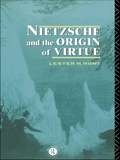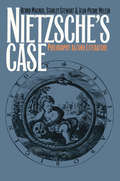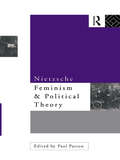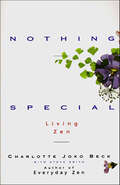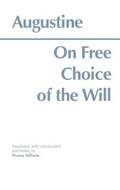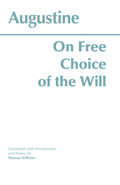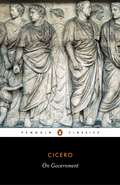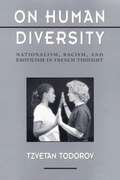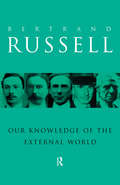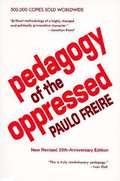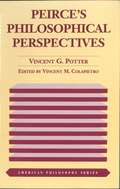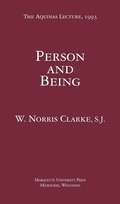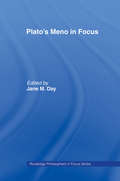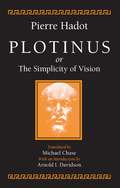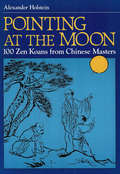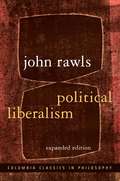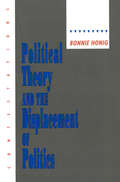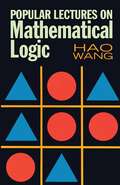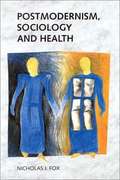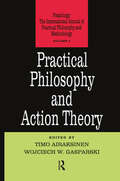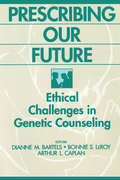- Table View
- List View
Nietzsche and the Origin of Virtue (Routledge Nietzsche Studies)
by Lester H. HuntIn Ecce Homo (1908) Friedrich Nietzsche calls himself "the first immoralist" and adds "that makes me the annihilator par excellence". Lester Hunt examines this and other radical claims in order to show that Nietzsche does have a coherent ethical and political philosophy. He uses Nietzsche's writings as a starting point for a critique of a wider, contemporary ethical project - one that should inform our lives as well as our thoughts.
Nietzsche's Case: Philosophy as/and Literature
by Bernd Magnus Stanley Stewart Jean-Pierre MileurFirst published in 1993. Routledge is an imprint of Taylor & Francis, an informa company.
Nietzsche, Feminism and Political Theory
by Paul PattonAre you visiting women? Do not forget your whip!''Thus Spoke Zarathustra'the democratic movement is...a form assumed by man in decay'Beyond Good and EvilNietzsche's views on women and politics have long been the most embarrassing aspects of his thought. Why then has the work of Nietzsche aroused so much interest in recent years from feminist theorists and political philosophers?In answer, this collection comprises twelve outsanding essays on Mietzsche 's work to current debates in feminist and political theory, It is the first to focus on the way in which Nietzche has become an essential point of reference for postmodern ehtical and political thought.
Nothing Special: Living Zen
by Charlotte Joko Beck Steve SmithThe Zen master and author of Everyday Zen shares the simple, essential wisdom of embracing the ordinary in life.Zen is life itself, nothing added. But for many of us, pursuing a spiritual path involves fantasies about our future lives—fantasies that separate us from ourselves and leave us anxious to achieve a resolution that is constantly receding just past the horizon of reality. In Nothing Special, Charlotte Joko Beck reveals how living in the knowledge that “things are always just as they are” is not the counsel of despair but an invitation to joy.Author of the Zen classic, Everyday Zen, Charlotte Joko Beck now shows readers how to awaken to daily life and discover the ideal in the everyday, finding riches in our feelings, relationships, and work. Nothing Special offers the rare and delightful experience of learning in the authentic Buddhist tradition with a wonderfully contemporary Western master.
On Free Choice of the Will
by Saint AugustineOn Free Choice of the Will It presents the essentials of Augustine's ethics, his theory of knowledge, and his views of God and human nature. Translated and with an introduction by Thomas Williams
On Free Choice of the Will
by Thomas Williams AugustineTranslated with an uncanny sense for the overall point of Augustine's doctrine. In short, a very good translation. The Introduction is admirably clear.--Paul Vincent Spade, Indiana University
On Government
by CiceroThese pioneering writings on the mechanics, tactics, and strategies of government were devised by the Roman Republic's most enlightened thinker.
On Human Diversity: Nationalism, Racism, And Exoticism In French Thought
by Tzvetan Todorov Catherine PorterHow can we think about people and cultures unlike our own? In the early modern period, the fact of human diversity presented Europeans with little cause for anxiety: they simply assumed the superiority of the West. During the 18th century this view was gradually abandoned, as thinkers argued that other peoples possessed reason and sensibility, and thus deserved the same respect that Westerners accorded themselves. Since that time, however, Enlightenment belief in the universalities of human nature has fallen into disrepute; critics allege that such notions have had disastrous consequences in the 20th century, ranging from prejudice to persecution and outright genocide.
Our Knowledge of the External World: As A Field For Scientific Method In Philosophy (classic Reprint)
by Bertrand Russell'Philosophy, from the earliest times, has made greater claims, and acheived fewer results than any other branch of learning ... I believe that the time has now arrived when this unsatisfactory state of affairs can be brought to an end' - Bertrand Russell So begins Our Knowledge of the Eternal World, Bertrand Russell's classic attempt to show by means of examples, the nature, capacity and limitations of the logico-analytical method in philosophy.
Pedagogy of the Oppressed
by Myra Bergman Ramos Paulo FreirePaulo Freire has perfected a method for teaching illiterates that has contributed, in an extraordinary way, to that process. In fact, those who, in learning to read and write, come to a new awareness of selfhood and begin to look critically at the social situation in which they find themselves, often take the initiative in acting to transform the society that has denied them this opportunity of participation. Education is once again a subversive force.
Peirce's Philosophical Perspectives (American Philosophy #Vol. 3.)
by Vincent G. PotterThis collection focuses primarily on Peirce’s realism, pragmatism, and theism, with attention to his tychism and synechism.
Person and Being (The Aquinas Lecture in Philosophy Series)
by W. Norris ClarkePerson and Being (Aquinas Lecture)
Philosophical Imagination and Cultural Memory: Appropriating Historical Traditions
by Patricia CookDoes philosophy have a future? Postmodern thought, with its rejection of claims to absolute truth or moral objectivity, would seem to put the philosophical enterprise in jeopardy. In this volume some of today's most influential thinkers face the question of philosophy's future and find an answer in its past. Their efforts show how historical traditions are currently being appropriated by philosophy, how some of the most provocative questions confronted by philosophers are given their impetus and direction by cultural memory.Unlike analytic philosophy, a discipline supposedly liberated from any manifestation of cultural memory, the movement represented by these essays demonstrates how the inquiries, narratives, traditions, and events of our cultural past can mediate some of the most interesting exercises of the present-day philosophical imagination. Attesting to the power of historical tradition to enhance and redirect the prospects of philosophy these essays exemplify a new mode of doing philosophy. The product of a National Endowment for the Humanities Summer Institute in 1990, it is the task of this book to show that history can be reclaimed by philosophy and resurrected in postmodernity.Contributors. George Allan, Eva T. H. Brann, Arthur C. Danto, Lynn S. Joy, George L. Kline, George R. Lucas, Jr., Alasdair MacIntyre, Robert C. Neville, John Rickard, Stanley Rosen, J. B. Scheenwind, Donald Phillip Verene
Plato's Meno In Focus (Philosophers in Focus)
by Jane M. DayIn one volume, this book brings together a new English translation of Plato's Meno, a selection of illuminating articles on themes in the dialogue published between 1965 and 1985 and an introduction setting the Meno in its historical context and opening up the key philosophical issues which the various articles discuss. A glossary is provided which briefly introduces some of the key terms and indicates how they are translated. The Meno is an excellent introduction to Plato and philosophy.
Plotinus or the Simplicity of Vision
by Pierre HadotSince its original publication in France in 1963, Pierre Hadot's lively philosophical portrait of Plotinus remains the preeminent introduction to the man and his thought. Michael Chase's lucid translation—complete with a useful chronology and analytical bibliography—at last makes this book available to the English-speaking world. Hadot carefully examines Plotinus's views on the self, existence, love, virtue, gentleness, and solitude. He shows that Plotinus, like other philosophers of his day, believed that Plato and Aristotle had already articulated the essential truths; for him, the purpose of practicing philosophy was not to profess new truths but to engage in spiritual exercises so as to live philosophically. Seen in this light, Plotinus's counsel against fixation on the body and all earthly matters stemmed not from disgust or fear, but rather from his awareness of the negative effect that bodily preoccupation and material concern could have on spiritual exercises.
Pointing at the Moon
by Alexander HolsteinPointing at the Moon comprises one hundred brilliant examples of the Ch'an masters' questions and answers from the following four treatises of the Ch' an tradition: A Selection From the Five Books of the Ch 'an Masters' Sayings, The Light of the Ch 'an Sayings Recorded in the Year if Developing Virtue (A.D. 1004), The Ch'an Sayings Recorded During the Moonlit Meditation, and An Anthology if Ch'an Sayings,
Pointing at the Moon
by Alexander HolsteinPointing at the Moon comprises one hundred brilliant examples of the Ch'an masters' questions and answers from the following four treatises of the Ch' an tradition: A Selection From the Five Books of the Ch 'an Masters' Sayings, The Light of the Ch 'an Sayings Recorded in the Year if Developing Virtue (A.D. 1004), The Ch'an Sayings Recorded During the Moonlit Meditation, and An Anthology if Ch'an Sayings,
Pointing at the Moon
by Alexander HolsteinThis collection of Zen koans with extensive commentary will be of great interests to followers of Zen Buddhism.People around the world value the mind-cleansing, spiritually uplifting benefit to be gained through the practice of Cha'an (Zen) Buddhism. Central to Zen is the enigmatic koan (kung-an), a kind of riddle used by masters to shock their students into greater awareness. In this timeless collection from Chinese masters, translations of 100 of these question-and-answer riddles are presented. Each koan is followed by the author's commentary, which provides fascinating insight into the background and deeper meanings of the koans.Pointing at the Moon contains zen koeans from the following four treatises of the Zen tradition: A Selection From the Five Books of the Zen Masters' Sayings The Light of the Zen Sayings Recorded in the Year if Developing Virtue The Zen Sayings Recorded During the Moonlit Meditation An Anthology if Zen SayingsEnhanced by the 85 beautifully sketched Chinese brush paintings, Pointing at the Moon is a text certain to stimulate and challenge anyone interested in learning more about Zen and its tradition of spiritual enlightenment.
Political Liberalism: Expanded Edition (Columbia Classics in Philosophy #Vol. 4)
by John RawlsThis book continues and revises the ideas of justice as fairness that John Rawls presented in A Theory of Justice but changes its philosophical interpretation in a fundamental way. That previous work assumed what Rawls calls a "well-ordered society," one that is stable and relatively homogenous in its basic moral beliefs and in which there is broad agreement about what constitutes the good life. Yet in modern democratic society a plurality of incompatible and irreconcilable doctrines—religious, philosophical, and moral—coexist within the framework of democratic institutions. Recognizing this as a permanent condition of democracy, Rawls asks how a stable and just society of free and equal citizens can live in concord when divided by reasonable but incompatible doctrines?This edition includes the essay "The Idea of Public Reason Revisited," which outlines Rawls' plans to revise Political Liberalism, which were cut short by his death. "An extraordinary well-reasoned commentary on A Theory of Justice...a decisive turn towards political philosophy." —Times Literary Supplement
Political Theory and the Displacement of Politics
by Bonnie Honig03 In this book, Bonnie Honig rethinks that established relation between politics and political theory. From liberal to communitarian to republican, political theorists of opposing positions often treat political theory less as an exploration of politics than as a series of devices of its displacement. Honig characterizes Kant, Rawls, and Sandel as virtue theorists of politics, arguing that they rely on principles of right, rationality, community, and law to protect their political theories from the conflict and uncertainty of political reality. Drawing on Nietzsche and Arendt, as well as Machiavelli and Derrida, Honig explores an alternative politics of virtù, which treats the disruptions of political order as valued sites of democratic freedom and individuality.
Popular Lectures on Mathematical Logic
by Hao WangA noted logician and philosopher addresses various forms of mathematical logic, discussing both theoretical underpinnings and practical applications. Author Hao Wang surveys the central concepts and theories of the discipline in a historical and developmental context, and then focuses on the four principal domains of contemporary mathematical logic: set theory, model theory, recursion theory and constructivism, and proof theory.Topics include the place of problems in the development of theories of logic and logic's relation to computer science. Specific attention is given to Gödel's incompleteness theorems, predicate logic and its decision and reduction problems, constructibility and Cantor's continuum hypothesis, proof theory and Hilbert's program, hierarchies and unification, proof of the four-color problem, the Diophantine problem, the tautology problem, and many other subjects. Three helpful Appendixes conclude the text.
Postmodernism, Sociology and Health
by Nicholas J. FoxThe emergence of post-structuralism and postmodernism within social theory has challenged many of the fundamentals of modernist social science. The emphasis which these approaches place on language, firstly as the unavoidable mediator between an object of study and a description of that object, and secondly as something which is profoundly unstable, marks the broadest of these challenges -- to the possibility that sociology and the other human sciences might achieve rational knowledge of the world.
Power without Force
by Robert W. JackmanExplores the ways states build political capacity; discusses how states learn to resolve conflict politically rather than violently
Practical Philosophy and Action Theory
by Timo AiraksinenAction theory and practical philosophy have their well-grounded tradition both in Finland and in Poland. This text is a collection of PRACTICAL PHILOSOPHY AND ACTION THEORY Praxiology: The International Annual of Practical Philosophy and Methodology Volume 2. This volume is divided into three parts: the first one being, so to speak, a ‘business card’ of Finland’s contemporary practical philosophy, the second one being a ‘business card’ of the Poland’s present praxiology, and a collection of contributions from other philosophical environments related to the topics.
Prescribing Our Future: Ethical Challenges in Genetic Counseling
by Diane M. Bartells Bonnie LeRoyGenetic counselors translate the findings of scientific investigation into meaningful accounts that enable individuals and families to make decisions about their lives. This collection of original papers explores the history, values, and norms of that process, with some focus on the value of nondirectiveness in counseling practice. The contributors; examination of genetic counseling issues serves as a foundation from which to address other ethical, legal, and policy considerations in the expanding universe of clinical genetics.
